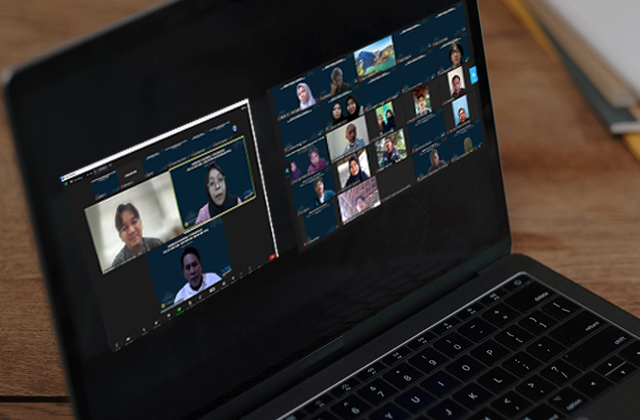The 7th Unram National Seminar Talk Show: Encouraging Disaster Resilient Villages and Community Empowerment through KKN PMD

Mataram, University of Mataram – The Institute for Research and Community Service of the University of Mataram (LPPM Unram) held the 7th National Seminar Talk Show of the University of Mataram which took place online via the zoom application on Thursday (22/2).
In this activity, the Head of LPPM Unram, Prof. Dr. Ir. Sukartono, M.Agr. accompanied by Dr. Ir. Misbahuddin, ST., MT., IPU. as the Head of KKN and Cooperation Management Center; Chairman of the National Seminar Committee, Andre Rachmat Scabra, S.Pi., M.Si.; Secretary of KKN Services, Dr. Ni Wayan Sri Suliartini, SP., MP.; Field Supervisors (DPL); and groups that follow the PMD KKN program.
This seminar activity presented 5 speakers including: M. Ihsan A.P., S.Tr.Kom, M. Kom. from Kalimantan Institute of Technology (ITK) with the material of Electronic Based System Development in Disaster Management as a Smart City; Samsyiah Samad, S.Hut., M.Si from BPBD NTB with the theme of the Role and Challenges of Implementing KKN Unram Disaster Resilient Village; Eka Sunarwidhi P, S.Si., M.Sc., Ph.D. from the University of Mataram with the material Importance of basic medical knowledge: implementation of POMK project in Indonesia; Prof. Dr. Ir. Sukartono, M.Agr from the University of Mataram with the material Potential Disasters on Lombok Island and Unram’s Role in Encouraging Disaster Resilient Villages; and Prof. Masao Miyake, Ph.D. from Fukushima Medical University with the material POMk Project Popularization of Medical-knowledge.
Starting this activity, Andre Rachmat Scabra, S.Pi., M.Si. as the Chairperson of the Committee reported that, “The implementation of this National Seminar is an activity that is carried out 2 (two) times a year as part of the implementation of the Real Work Lecture (KKN) Village Community Empowerment (PMD) which has been carried out since 2020.”
Furthermore, the young lecturer of the fisheries study programme said, “The implementation of this seminar was carried out through two sessions, namely a plenary session by presenting 5 speakers and a parallel session to present articles on the results of the implementation of KKN PMD by 179 groups in 179 villages and added with 15 articles on the results of KKN MBKM.”
The implementation of KKN PMD in this period, the LPPM Unram KKN Management Centre collaborated with the West Nusa Tenggara (NTB) Regional Disaster Management Agency (BPBD) with the theme of Disaster Resilient Villages (DESTANA) with a total of 300 students spread across 30 villages, with a total distribution of Field Supervisors (DPL) spread across 4 districts with numbers: West Lombok 25 DPL, North Lombok 27 DPL, East Lombok 71 DPL, and Central Lombok 46 DPL.
On the same occasion, the Head of LPPM Unram, Prof. Dr. Ir. Sukartono, M.Agr. in his speech said, “KKN activities in this period are based on Village Community Empowerment (PMD) where there are special topics that become the theme of the implementation of KKN PMD, namely: Disaster Resilient Village (DESTANA) in collaboration with the Regional Disaster Management Agency of NTB Province spread across 30 villages in the hope of preparing the community to be more prepared in mitigating disasters.”
Not only that, the implementation of KKN PMD this year Unram collaborated with Fukushima Medical University Japan with the theme of Basic Health Education for Village Communities located in the Mandalika area, precisely in Sengkol Village, as an effort to create a healthy and resilient community.
“LPPM as an institution that oversees the implementation of the PMD Real Work Lecture (KKN) will continue to evaluate the implementation and service of KKN, as an effort to realise the real service of Mataram University to the community. This is also the seriousness of the University of Mataram in taking a role and contribution in regional development,” said Prof Sukartono.
KKN activities are one of the community service activities in which students are expected to be able to practice science, technology and art to solve problems faced by the community and overcome them fragmentarily.
